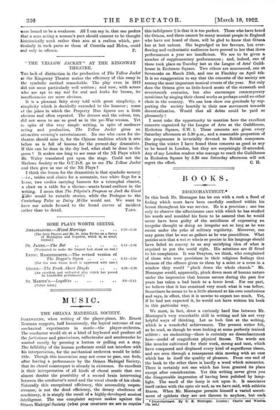MUSIC.
THE ORIANA MADRIGAL SOCIETY.
SOMEWHERE, when writing of the player-piano, Mr. Ernest Newman suggests, half humorously, the logical outcome of our mechanical experiments in music—the player-orchestra. The conductor would sit at a kind of keyboard and produce all the fortissimos and pianissimos, rallentandos and accelerandos he wanted merely by pressing a button or pulling out a stop. The fallibility of the human performer could not interfere with his interpretation, for the mechanical orchestra would be infal- lible. Though this innovation may not come to pass, one feels, after leaving a performance by the Oriana Madrigal Society, that its choral counterpart is already in existence. So excellent is their interpretation of all kinds of choral music that one almost doubts the possibility of a second brain intervening between the conductor's mind and the vocal chords of his choir. Naturally this exceptional efficiency, this astounding respon- siveness, is not the dead efficiency, the dreary obedience of machinery, it is simply the result of a highly-developed musical intelligence. The one complaint anyone makes against the °rums, Madrigal Society (what poor creatures we are to require
this indulgence !) is that it is too perfect. Those who have heard the Oriana, and there cannot be many musical people in England who have not heard of them, will be glad to know that Oriana has at last unbent. She begrudged us her favours, but over- flowing and enthusiastic audiences have proved to her that three performances a year are insufficient. We are to be given a number of supplementary performances ; and, indeed, one of these took place on Tuesday last at the League of Arts' Guild- house in Eccleston Square. Two others are announced, one at Sevenoaks on March 25th, and one at Finchley on April 4th. It is no exaggeration to say that the concerts of the society are among the most important musical events of the year. Not only does the Oriana give us little-heard music of the sixteenth and seventeenth centuries, but also encourages contemporary musicians by singing their choral works as perhaps could no other choir in the country. We can best show our gratitude by sup- porting the society heartily in their new movement towards decentralization. Would that all debts could be paid so pleasantly !
I must take the opportunity to mention here the excellent concerts organized by the League of Arts at the Guildhouse, Ee.cleston Square, S.W. 1. These concerts are given every Saturday afternoon at 5.30 p.m., and a reasonable proportion of the programme is invariably devoted to British composers. During the winter I have found these concerts as good as any to be heard in London, but they are surprisingly ill-attended. Any of my London readers who manage to reach the Guildhouse in Eccleston Square by 5.30 one Saturday afternoon will not


































 Previous page
Previous page